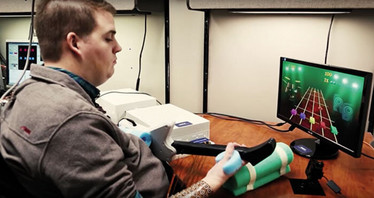Mind Over Matter
Neural implants and smart software give a paralyzed patient the gift of movement
Ian Burkhart, a 24-year-old quadriplegic, has been able to regain direct control over his right arm, using a system that circumvents his damaged spinal cord with a neural implant, a software interface, and a special sleeve (1). The neural implant in Burkhart’s motor cortex reads synaptic impulses that are converted by algorithms into stimulating electrode signals for Burkhart’s arm, which responds with muscle contractions – and the desired movement. The results have been impressive; trials started back in 2014 and now Burkhart can swipe a credit card and even play video games. To learn more, we spoke with Chad Bouton, first author of the new paper in Nature and Division Leader of Neurotechnology and Analytics at The Feinstein Institute for Medical Research.

Patient Ian Burkhart plays a video game in the lab.
How did you end up bringing paralyzed limbs back to life?
My background is in electrical engineering and engineering mechanics. I hadn’t really planned on going into the medical field until an opportunity came up to work in a medical technology R&D group at Battelle about 10 years ago. I was able to get involved with some of the very first patients that had been implanted with microchip electrode arrays in the motor area of the brain, and that’s when I fell in love with neurotechnology and the nervous system.
How are neural impulses linked with physical movements?
We actually treated it a bit like learning a language; we used the process of association. We showed on-screen images of a hand moving, doing very specific finger and wrist movements. The patient watched those movements and we recorded the brain activity, then we attempted to link those together. Special software that we’ve developed learnt the brain activity, then built a decoder, with correction inputs from us if needed. The more interaction there was, the better it became at recognizing the patterns and associating them with different movements. The participant started to make improvements as well, and refined their thought patterns, so the machine and patient were actually learning together. It really was an amazing process to watch.
What has the reaction been like so far?
We’ve received a tremendous amount of positive feedback. The scientific community recognizes that there’s still a lot of work to be done – namely, refinement of the technology – before it reaches the market one day. But it really is an important step forward and I think it is motivating researchers to work even harder – and even encouraging young people to get involved in the field.
What’s next?
The current study has approval for up to five participants so there are plans for future patients, and there has been an extension of study for the current participant, which is great news. We’re also thinking about other types of research studies we can do in spinal cord injury, and eventually our investigation may branch into more complex avenues, such as patients with stroke or brain injury.
- CE Bouton et al., “Restoring cortical control of functional movement in a human with quadriplegia”, Nature (2016, Epub ahead of print). PMID: 27074513.
My fascination with science, gaming, and writing led to my studying biology at university, while simultaneously working as an online games journalist. After university, I travelled across Europe, working on a novel and developing a game, before finding my way to Texere. As Associate Editor, I’m evolving my loves of science and writing, while continuing to pursue my passion for gaming and creative writing in a personal capacity.















